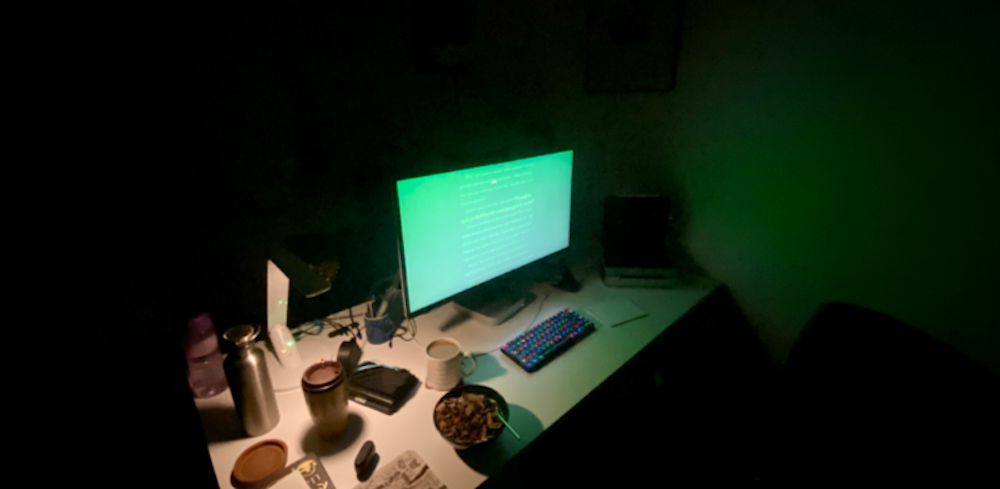Daily writing routine - February 2023
The lowdown on how I'm getting the words down.

I’ve seen a few writers do posts about their writing routine over the last few years, in particular noting when and how it changes over time. And I’m a massive sucker for anything about routines myself. So I thought I’d do one too.
I’ve been writing regularly (as in, without any extended gaps aside from planned time off) since late 2020. Before that, my writing was reasonably productive, but very inconsistent, swinging wildly between huge bursts of productivity followed by months of angst and very little writing at all.
Three years on, I’m reasonably sure this routine is here to stay, though it has changed in small and interesting ways over the years.
Caveats
First, I don’t have kids, so my days are both relatively predictable and don’t involve school/nursery runs. I have friends who manage similar amounts of writing time who do have kids, but they are definitely doing it through dogged persistence, supportive partners and flexible jobs that allow them to grab time at odd hours.
Second, I work from home, so I don’t commute. When I did commute, I used to work on the train, but it’s a lot tougher if you need to drive anywhere.
Third, I am extremely boring and habituated to getting up very early - I go to bed reasonably early most days, I have cats who whack me in the face if I don’t get up and I’ve successfully trained my eyes to snap open at half five on the dot. Some people find this time late at night. I can’t do that, but if it works for you, go for it.
The routine
I work on writing for ninety minutes, every weekday morning. I say ‘work on writing’ because that time can include basically anything; drafting something new, doing an editing pass, working on critique partner notes, reading a draft out loud to myself. I try not to use this time for writing-adjacent stuff that’s not actually producing fiction (like blog posts, pitch documents etc) although occasionally if I have a deadline I will.
I get up at 05:30 in the morning, get straight in the shower, get dressed, then head downstairs to make breakfast and feed our two cats, Olaf and Pablo. I’m usually heading back up the stairs to my office by around 06:15 or so, carrying a very large mug of tea and a bowl of cereal. This time of the morning is incredibly quiet where I live (a village in East Lothian, Scotland) and I’m quite often in a strange half-awake state, even after I’ve had my shower.
I’ve learned over the years that this time of day is my absolute most productive - before I’ve done any day job work, before I’ve engaged with anyone or anything online. I haven’t made any decisions or really used my brain at all yet. Climbing the stairs has become a mental cue that the writing day is beginning and I’m usually turning over the next scene or thing I have to edit in my head before I reach the top.
I put my phone in my wardrobe (this is more symbolic than anything else, since I have an iPad sitting on the desk next to me and a fully internet-connected Mac in front of me), pop on a massive pair of noise-cancelling headphones and put on some appropriate music (often general chillout music, sometimes something a bit faster or thematically relevant to what I’m writing, never with any memorable lyrics of any kind). Then I start a ninety minute timer on my watch and start working.
A huge amount of this routine is a series of cues, one after the other, which push my brain into working mode. Tea plus cereal plus stairs plus headphones equals writing.
I’m usually working in Scrivener, on a large monitor, sometimes with critique partner notes on my iPad screen, if I’m doing a revision. If I’m working from revision notes of my own I’ll have my Kobo e-reader in front of me - I use the annotations feature to make a list of edits. Sometimes, if I’m working on a major change across multiple elements of a book, I’ll be working through a checklist in Things 3 to make sure I make the change in all the places I need to.

Once my timer finishes, I check my word count (either how much I added or how much I cut), then update my spreadsheet, post how much I did to various writing Discord servers I’m on and shut down for the day. Then I go out for about an hour’s walk through the nearby woods, down to the sea and home again, with just about enough time left to make a cup of tea, write a brief journal entry and login to do my day job.
I work from home, which is what allows me to stick to this schedule. And the walking has become a really integral part of my morning - a clear break between my writing and my day job and an opportunity to think about what I just wrote. I carry a digital voice recorder with me and often mutter into it about what I’m going to do the next day.
I don’t write in the evenings (unless I have a very critical deadline) and I don’t write at weekends (again, unless I have a deadline). My lunch breaks are mostly for reading or gaming and my evenings are for exercise, housework and spending time with my partner.
Changes and experiments
This is quite different to the routine I started with. I used to write for an hour and I used to write every day. I started by taking Sundays off, then after months of procrastinating every Saturday (because I’m getting up later and there’s stuff to be done like housework and trips into town etc) I decided to can Saturdays as well.
I settled on ninety minutes because I was finding that I’d quite often faff around when I had an hour and actually only end up writing for thirty or forty minutes. Ninety minutes is enough time to do a bit of faffing and still get into the zone and write happily for 60-70 minutes. And when I manage to write for a full hour and a half I tend to get really great word counts.
The only real variable to this process is when I travel for work, which is usually 2-3 nights away per month. In that case I try to do as much in the same way as I can, but I’m usually working on my iPad Pro rather than a Mac and I’m working on the hoof, often on the train. It’s such an ingrained habit at this point that this isn’t a particular challenge, but I’m still quietly chuffed when I manage to keep up my regular 90 minute daily practice even when I’m at the other end of the country.
Mindset shifts
I used to be very focused on word counts and hard metrics and switching to focusing on the regularity and quality of my writing practice instead has, bluntly, changed my life. I’m a lot happier now. Over time my process becomes steadily less focused on the output of any given day and more focused on consistency.
A nice side effect of this has been the shift in my view of my own writing. For a long time, it often felt like never-ending, self-imposed homework; the result of a decision I’d made in my teens to be ‘a writer’ which I constantly felt was impinging on every other aspect of my life. But I’ve realised that when my writing effort is focused on a regular sustainable routine, it instead becomes what it should have been all along - a creative outlet and essential element of my overall wellbeing that adds to my life.
Future goals
I’m pretty happy with my process right now, so I don’t see it changing in any material way unless my life changes. If I’m ever fortunate enough to write full time, I’ll doubtless revisit things, but that’s the unknowable future.
In the meantime, I’ll continue to experiment and fiddle around at the edges. When I do, I’ll write another post like this one.
—-
Got a question about my routine or something else? Get in touch over on Mastodon or Twitter, or send me a message on my contact form.
